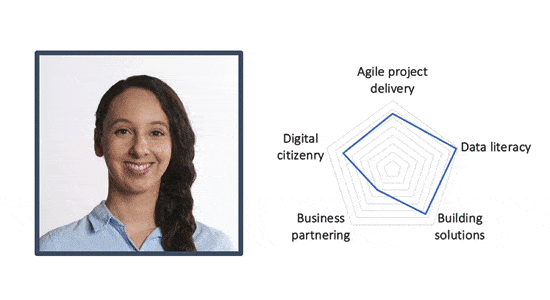
While digital transformation continues to be a top priority for companies, a recent poll by McKinsey revealed that only 13% of CFOs have started using automation. Furthermore, the vast majority of companies polled had only managed to digitise less than a quarter of their finance function. According to Deloitte's CFO sentiment report, many companies find their staff lack the digital skills necessary to meet their digital ambitions.
What are "digital skills"? In helping finance teams digitise over the past decade, we've identified five core skill groups that staff need to be across to be capable of delivering digital transformation projects such as automation and analytics. The skills include:
- Agile Project Delivery
- Data Literacy
- Solution Building
- Business Partnering
- Digital Citizenry
By scoring each member of the team against these skills you form a picture of the digital strengths and weaknesses across the group.

In this post, I've detailed each of the five digital skills. I have also included a free, Digital Skills Matrix template at the bottom of this post.
Skill 1: Agile Project Delivery
In order to successfully deliver digital transformation, staff need to first dissect a problem and manage the work to ensure the right solution is delivered.

In the context of digital skills, agile project delivery falls into two main categories; business analysis and project management. Business analysis refers to staff members ability to:
- Analyse a problem statement with enough granularity to identify the root cause of the problem that they are being asked to solve.
- Deconstruct user needs and translate those needs into the features of the digital solution
- Research and evaluate the as-is process using tools like flowcharts, swim-lanes and data flow diagrams.
- Present a "future-state" vision of the digital solution to users and stakeholders using diagrams, wireframes and feature lists
Project management then becomes critical in ensuring staff are able to deliver working solutions that meet the needs of the users (discovered by the business analysis work they performed earlier). This includes the ability to:
- Plan and deliver using agile frameworks like Scrum and Kanban or to at least operate using an agile philosophy (when working in a non-agile environment).
- Deal with issues that may block successful delivery while also managing the risks and dependencies of the project.
- Focus on delivering a working solution for users early and then frequently iterating and improving the solution where required.
Skill 2: Data Literacy
Data is front and centre to many digital transformation efforts, mainly where projects focus on the implementation of better and more advanced analytics. Data literacy, therefore, should be one of the essential digital skills for finance teams to have. Disappointingly, however, less than 20% of decision-makers believe their companies adequately support the development of data literacy skills in their organisation.

By "Data Literacy" we are referring to skills ranging from Data Wrangling, Statistics and the ability to visualise data and craft a narrative (data storytelling). Data Wrangling refers to an ability to:
- Work with and enrich available data to form an understanding of how that data aligns with the problem statement and the planned digital solution.
- Check data for accuracy and put solutions in-place (e.g. validation) to ensure data continues to be accurate and credible going forward.
Staff should be able to demonstrate a knowledge of basic statistics such as probability, correlation vs. causation and uncertainty and have an ability to produce appropriate summary statistics
Finally, staff must be able to translate data into visualisations and then engage in data storytelling - that is, craft a narrative that helps stakeholders better understand and utilise the analysis and insights that finance presents to them. Staff must also be amenable to learning how to use tools like Tableau, PowerBI and Yellowfin.
Skill 3: Solution building
If staff are going to succeed in their digital projects, they need to be able to build solutions. This is where digital skills like programming, solution design and quality assurance become essential. Furthermore, staff need to be comfortable with learning and using new tools for automation and analytics.

When it comes to programming, the goal is not to hire or turn finance staff into software engineers. Instead, the aim is to provide staff with some exposure to coding and algorithmic thinking. Many of the modern tools for automation and analytics support languages such as SQL, Python and R. Staff who can work with these languages will add a tremendous amount of versatility in their ability to add bespoke features that are otherwise not available "out-of-the-box".
The most common types of digital tools that staff will be expected to learn and master include:
- Finance automation tools like SolveXia as well as Robotic and Digital Process Automation tools.
- Narrow AI technologies such as Natural Language Processing / Generation and Image Recognition
- Analytics platforms like YuCalc
Staff will need to develop their ability around user-centred design, allowing them to identify the "real" needs of users and stakeholders through research and then design solutions that shows precisely how the user needs will be met. When it comes time to do the work (building the solution), staff must also be well-versed in a solution development lifecycle and be competent in their ability to test their work for quality.
Skill 4: Business partnering
According to PwC, finance spend only 24% of their time on insight generating activities. This percentage should increase as staff utilise modern tools for automation and analytics. Business partnering, therefore, needs to be considered as an essential skill that will not only ensure finance staff can leverage their seat at the business decision-making table but also help ensure the success of digital projects - through engaging and working collaboratively with the users and stakeholders.

Staff need to develop their skills in areas such as:
- Influencing business stakeholders
- Driving and managing change
- Being a tenacious digital evangelist while also being patient and empathetic to the business.
- Networking and building relationships with other business leaders.
In addition to developing these skills through training and eLearning, finance staff should be looking to use any spare capacity generated through automation to grow by spending more time away from their desk (and spreadsheets) attending meetings and networking across the business.
Skill 5: Digital Citizenry
In an age where data breaches have become the norm, there is a tendency to focus on the threat of anonymous boogeymen (hackers), however, 52% of data breaches are caused by human error such as:
- Weak passwords; and
- Falling for phishing scams; and
- Sending sensitive information to the wrong person.
Being a good digital citizen can easily be ignored as its impact will not always be immediate. However, the effect of being a poor digital citizen can be catastrophic, quickly tearing down any credibility and trust in a digital transformation program.

Staff need to ensure they are "in-touch" with the wider digital community (including technology vendors and service providers). They also need to be capable of aligning business stakeholders around a singular digital vision.
Staff must also set a good for the business when it comes to ensuring the privacy of your customers and the security of your organisation's data. This includes understanding and applying your companies data security and privacy policies and ensuring they have a good knowledge of things like password security and data encryption.
Free digital skills matrix template
I've detailed each of the five skills in this post in a "Digital Skills Matrix" that allows you to score up to five people:

The template then generates your personalised skills matrix:

Download the matrix template
FAQ
Related Posts
Our Top Guides
Our Top Guide
Popular Posts
Free Up Time and Reduce Errors
Intelligent Reconciliation Solution
Intelligent Rebate Management Solution
Recommended for You

Request a Demo
Book a 30-minute call to see how our intelligent software can give you more insights and control over your data and reporting.

Reconciliation Data Sheet
Download our data sheet to learn how to automate your reconciliations for increased accuracy, speed and control.

Regulatory Reporting Data Sheet
Download our data sheet to learn how you can prepare, validate and submit regulatory returns 10x faster with automation.

Financial Automation Data Sheet
Download our data sheet to learn how you can run your processes up to 100x faster and with 98% fewer errors.

Financial Automation Data Sheet
Download our data sheet to learn how you can run your processes up to 100x faster and with 98% fewer errors.

Financial Automation Data Sheet
Download our data sheet to learn how you can run your processes up to 100x faster and with 98% fewer errors.

Financial Automation Data Sheet
Download our data sheet to learn how you can run your processes up to 100x faster and with 98% fewer errors.

Financial Automation Data Sheet
Download our data sheet to learn how you can run your processes up to 100x faster and with 98% fewer errors.

Financial Automation Data Sheet
Download our data sheet to learn how you can run your processes up to 100x faster and with 98% fewer errors.

Rebate Management Data Sheet
Download our data sheet to learn how you can manage complex vendor and customer rebates and commission reporting at scale.

Top 10 Automation Challenges for CFOs
Learn how you can avoid and overcome the biggest challenges facing CFOs who want to automate.



.jpeg)
